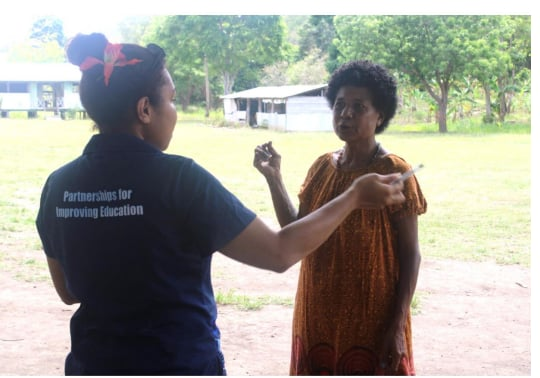Every school -related decision matters, particularly when the voices making these decisions sit on a school board and are expected to represent the diversity of their community.
Female participation on school boards in Papua New Guinea and globally has historically been limited, but efforts are being made to create a more inclusive, community-focused education system where women’s voices are proving not just valuable, but essential.
The Government of Australia, through the Partnerships for Improving Education (PIE) program, has put in place results-based financing grants through an initiative called Achieving Quality Education for All (AQEFA).
Thus, all participating schools are required to have female representation on the school board, and for schools in Autonomous Region of Bougainville the requirement is 50 per cent female representation on the board per the Bougainville Education Act.
One woman stands tall in the Kairuku District in Central Province, with her story or courage and influence in the education system, especially in decision making is Ms Bernadetta Oro.
Ms. Oro having served as the Secretary of the Biotou Elementary School Board of Management in Kairuku District, Central Province for over 2 decades, Bernadette Oro is a strong advocate for greater female involvement on school boards.
She is also the women’s representative on the School Learning Improvement Plan (SLIP) committee.
Bernadette’s involvement on the board began with her desire to represent the women in her community.
The SLIP is a school planning, budgeting and management tool and through her work with the SLIP committee Bernadette champions a vision of schooling that goes beyond academics.
Her role ensures that community members, parents and external stakeholders have an influence in the direction of their schools.
Bernadette’s commitment took her to a School Leadership Management workshop held at Mainohano Secondary School in May 2024, alongside senior teachers and other board members.
Bernadette studied behaviour management, budgeting, leadership and operational strategies required to effectively implement the SLIP.
The PIE-supported workshop gave her the necessary skills and knowledge to contribute to the school board’s decision-making processes.
She returned from the workshop inspired to bring this knowledge to her peers, making her an invaluable asset to her school board.
Bernadette reported that the training helped her to understand that a school is only as strong as the collaboration between teachers, parents and the broader community.
For Bernadette, building on community engagement is central to a school’s success.
After the workshop, she joined forces with church leaders, council members and local senior leaders to design a SLIP tailored to her school’s specific needs.
With a focus on budgeting within the SLIP’s 7 priority areas, the team worked to ensure that every Kina was strategically directed.
Bernadette worked with board members to complete the SLIP and requirements under the AQEFA grant.
Biotou successfully received its first AQEFA tranche in June and it was Bernadette had assisted in completing the grant acquittal positioning her school to receive a second tranche which will support completion of a classroom, purchase of water tanks and student health and nutrition awareness.
While Bernadette has played an instrumental role in her school board, she notes that many women face challenges in school governance and leadership.
Balancing family responsibilities with board commitments, navigating a male-dominated environment and advocating for community-centred programs can be demanding, but a community-minded women like Bernadette not only bring diverse viewpoints but are often in-tune with the needs and concerns of parents and students; this connection is essential to foster a more inclusive, comprehensive approach to education that benefits everyone.

